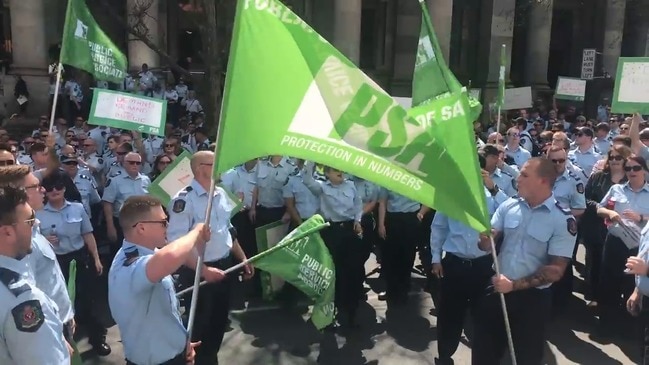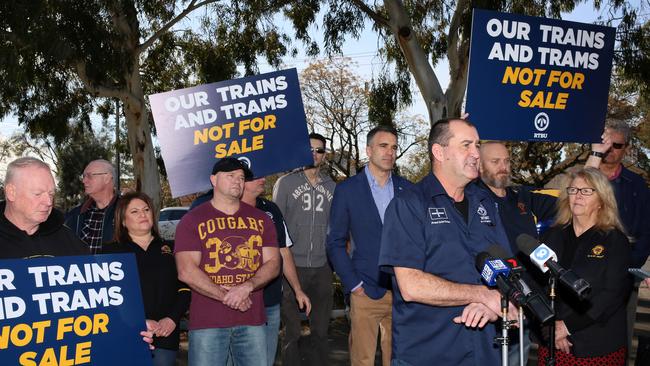Train, tram drivers stop work next week for State Government meeting
Trains and trams will stop for part of two days this month as the State Government holds meetings to talk directly to workers who will have to reapply for their jobs.

Train and tram workers have been called off the job for two days in a fortnight for mass meetings over job outsourcing.
But in a reversal of the traditional stop-work meeting tactic used by unions, the State Government has taken the extraordinary step of calling the workers out to address them together as it tries to negate criticism that its plans are “privatisation”.
Transport Minister Stephan Knoll said the strategy — on Tuesday, August 20, for train workers and Wednesday, August 21, for tram workers — was the only way to allow “a large proportion of employees to participate in the briefings at the same time’’.
“The four-hour suspension will occur during off-peak periods, between 9:30am and 1:30pm to minimise disruption,’’ he said.
The Transport Department will soon provide timetables for alternative bus services, as well as tram services on days train drivers are meeting and vice versa.
Mr Knoll pledged these would run at the same frequency as the existing train and tram timetables during the stop work meetings.
Unions and the Opposition are against what they call “privatisation” because workers will have to reapply for their jobs with private providers, in the same way that bus drivers currently do.
Rail, Tram and Bus Union SA Secretary Darren Phillips has vowed to make privatisation an election issue in 2022.

The Government argues because all assets, timetabling, ticket pricing, control of service levels and revenue remain with the taxpayer, the ‘outsourcing’, is simply seeking efficiency savings.
If it goes ahead, the tram service is set to operate under private ownership next year, with trains to follow in 2021. Bus services were outsourced by the previous Liberal Party government in 2000.
Mr Knoll said comprehensive briefings would be provided to workers over two three-hour sessions by the Department of Planning Transport and Infrastructure.
“The outsourcing of train and tram services will provide better services for public transport commuters,’’ he said.
The State Government has not committed to keeping all staff, but will focus on keeping drivers.
A formal tender document released in July called for private operators of train and tram services to explain how they would cut the cost of delivering services, ensure “fewer under-utilised” routes and achieve “more frequent and faster” travel for commuters.
Back office staff are on notice that their jobs could be cut, and especially positions which are duplicated between train and tram services.
“We have said from day one that we will ensure that the existing frontline workforce will be provided with the greatest level of opportunity for ongoing work,’’ Mr Knoll said.
“The department has already met with workers and the unions a number of times since the announcement and we are continuing to provide as much information as possible.
“Ultimately through this process we will provide a better service with the aim to provide more frequent services.
“The best way to provide more ongoing work for drivers is to increase patronage and increase the frequency of services.”
